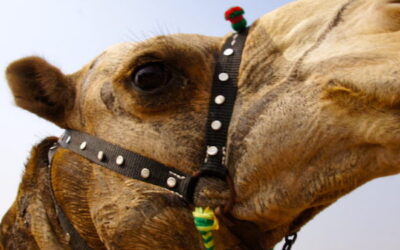 What’s the first you think of when you think of Egypt? Pyramids. Ok. Yes. But what comes after that? CAMELS!
What’s the first you think of when you think of Egypt? Pyramids. Ok. Yes. But what comes after that? CAMELS!
Camels are awesome creatures. Most of the time they’re cute and funny, but they can also be dirty and clumsy. But they’re some seriously incredible animals when you really get to know them.
There are two primary types of camels – dromedary and Bactrian (yes the second one is special and gets the capital B). The main thing to remember is that dromedary camels are the one-hump camels of the Middle East and Africa and they make up over 90% of all the world’s camels. The minority Bactrian camel population hails from central Asia and has two humps. They also have a very rare cousin called a “wild Bactrian” that’s technically a third distinct type of camel, but that’s getting way too wonky for our purposes here.
Camels have miraculously adapted to their harsh environments like you wouldn’t believe. They can lap up 50 gallons of water in just a couple of minutes and can sweat out up to a quarter of their body weight without dropping dead. While the thought that their distinctive humps are filled with stored water is just a myth, they instead store fat up there so that it doesn’t have to be stored throughout the rest of their bodies. This prevents the fat from serving as insulation and keeps their bodies lean and cool. They also have these weird oval-shaped blood cells, which fights dehydration, and their organs are so efficient at preserving water that their pee is more like a thick syrup than a liquid. Eww.
These regal animals have been used for transport for millennia by merchants, herders, and travelers across Africa and Asia. They’ve also featured prominently in the region’s militaries, and even in the U.S. military at one point. In 1856, 34 camels were imported from North Africa to Texas and in 1857 we acquired 41 more, which combined constituted the newly formed United States Camel Corps. The corps was primarily intended for use in the southwestern US but faded away when the outbreak of the Civl War back east took precedence.
Today, in addition to tourism and some transport and herding, camels are also a source of meat and milk in many countries across the Middle East and North Africa. Camel meat is chewy. Believe me, I’ve had it – as meatballs. And no it doesn’t taste like chicken. Camel dairy farms in many countries also harvest the milk of camels for, well, milk, but also for making camel cheese and even, wait for it… camel ice cream.
Camels have been known to bite, but the camels used in the tourism industry are bred to be passive and sweet. They can become dirty and sloppy if overused and overworked, but they are generally docile creatures. In some countries camels have also been known to be carriers of disease. A few years back, Middle East Respiratory Syndrome, or MERS, was traced back to camels in Saudi Arabia, but there aren’t really any Western tourists going to Saudi Arabia for its non-booming tourism industry and nonexistent nightlife.
When I was in Egypt in late 2015 with a friend who’s a doctor in the US, he was absolutely insistent on NOT touching any camels. But I and billions of others had ridden camels to the moon and back and we’re alive and healthy and fine. In Egypt one of the most popular places to obviously ride camels is at the Pyramids, but there’s a place to ride camels there and a place to avoid them. You should generally not accept offers to ride camels from the dudes right around the base of the Pyramids. They can range from slightly annoying with their offers to overtly rude and hostile if you don’t accept a camel ride.
And for Chirst’s sake please don’t accept their offer to take a picture of you in front of their camel. That’s a recipe for disaster. What almost always happens is they promise you up and down that it’s free of charge and they act offended if you turn them down. But as soon as you either a) take a picture with them or their animal, or worse b) give them your camera to take a picture of you with the camel or in front of a Pyramid, they will literally hold your camera for ransom until you pay them whatever they think they can extort out of you as a “fee” or “tip.” And then you’ll get mad and your magical experience will be forever marred by this annoying happenstance. If you’re not going to let me take you there and guarantee you’ll have a hassle-free experience, at least trust a brother on this stuff and heed my advice.
If you’re hopelessly alone at the Pyramids and want to ride camels, make your way off to the area to the distant right of the Pyramids after you enter the main gate. You’ll go around a few curves on a road and eventually make your way over to an overlook area where some families who in the business of camels are hanging out with their camel buddies and will happily give you the Pyramids camel experience with only 10% of the hussle you’ll get if you try to do the camels down by the Pyramids themselves.
If you’re in Egypt, you’ve got to try the camels. Unless you’re like my hypochondriac doctor friend Dave, you’ve just got to do it. Get the photos and have the experience of riding a camel through the [edge of] the Sahara. It’s amazing, and these sweet beautiful creatures are amazing too.




